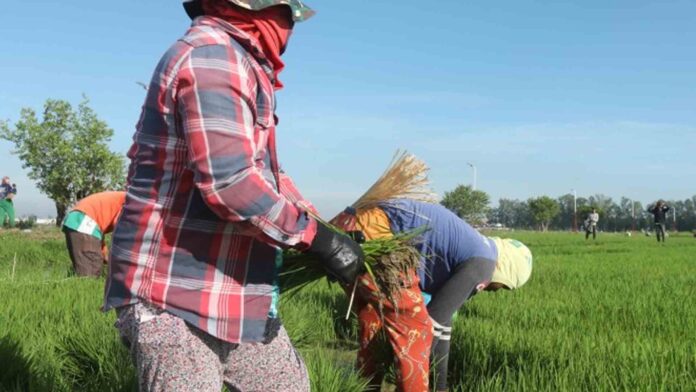The Rice Competitiveness Enhancement Fund (RCEF) Seed Program led by the Department of Agriculture-Philippine Rice Research Institute (DA-PhilRice) through its technology demonstration project known as ‘PalaySikatan’ continues to showcase the benefits of using recommended rice varieties and modern farm technologies in select areas in the country.
“We want farmers to personally experience the technologies and practices that we introduced. Because they do it themselves, they can witness and prove its efficiency. We are here to provide technical assistance from seed to seed,” RCEF Seed Program Field Operations and Monitoring Head Rizal Corales said in a news release on Monday.
Currently in its third year, PalaySikatan features modern inbred rice varieties coupled with integrated crop management practices and technologies in the major rice farm operations including crop establishment, pest and nutrient management, and harvest operations.
Among the nationally recommended rice varieties being promoted include NSIC Rc 222, Rc 216, and Rc 402 for the 2021 wet season to 2023 dry season. Location-specific varieties are also being cultivated in the techno demo, each varying according to the region and province where the site has been established.
“The seeds we are promoting are already pre-identified based on its adaptability in the area. When we say ‘national recommended varieties, these are suited anywhere in the country and anytime of the year,” Corales said.
The program also recommends the adoption of seeding rate for inbred rice, which is 40 kilogram per hectare when transplanted, or 60-80kg/ha when direct-seeded.
PalaySikatan farmer-cooperators are also urged to use nutrient diagnostic tools like the Minus-one Element Technique (MOET), a simple and practical diagnostic tool in assessing soil nutrient limitations in actual field conditions. It analyzes the main nutrients: nitrogen, phosphorus, and potassium, including the trace elements: copper, zinc, and sulfur, and provides more accurate fertilizer recommendations by determining the right element, amount and time of application.
Farm machines like seeders, spreaders, and transplanters for crop establishment, and combine harvester for harvesting are also strongly showcased in PalaySikatan.
Direct-seeded areas try the seed spreader, precision seeds and drum seeder while transplanted areas use the mechanical transplanters for planting. This enables farmers to follow the recommended seeding rate, and reduce work time and labor.
Compared with the conventional harvesting which can take at least one week per hectare, the combine harvester, which performs harvesting and threshing operations can help farmers harvest four to five hectares per day.
These recommendations are seen to help increase farmers’ yield and income, and reduce production cost.
During the 2021 wet season, farmers who served as cooperators of the techno demo have decreased their average production cost by at least PHP3. From Php12.01/kg, it was reduced to PHP8.75/kg.
Farmer field walks
At the end of the cropping season, field days are conducted to showcase the crop stand of the PalaySikatan farmer-cooperators. Farmers from nearby communities visit the sites and evaluate the varieties they see. They also get to discuss with the cooperators the findings of the demo.
“Farmers are invited to explore the techno demo sites and evaluate the varieties. They are asked to share their own observations and preferences so that our team can rate and evaluate the variety that is most preferred by the majority,” Corales said.
DA-PhilRice partners with the Provincial and Municipal Agricultural Offices in each local government unit (LGU) to identify the locations where they can put up the techno demo sites. They work closely in the field from technical briefings to harvesting, as well as from logistics to facilitating field days and field walks.
“Our LGUs play a significant role in PalaySikatan, as they work with us in almost every activity that we conduct in our sites,” Corales said.
Also helping are the other RCEF implementing agencies which include PhilMech, Agricultural Training Institute, Technical Education And Skills Development Authority, Development Bank of the Philippines, and LandBank.
Guiguinto Technician Roslyn Joan Benedictos said techno demo activities like PalaySikatan is an effective way to help farmers become more open to modern technologies and machinery they can employ to improve their farming practices.
Higher productivity, higher earnings
Farmer Orlando Cruz, 58, from Guiguinto, Bulacan, harvested 9.6 tons per hectare and earned PHP84,800 by planting NSIC Rc 436 he received from the RCEF Seed Program of the DA-PhilRice. His farm also served as one of the PalaySikatan technology demonstration sites of the municipality.
Since the program continuously educates rice farmers about modern technologies, Cruz seized this opportunity to enhance his farming knowledge, which will help him increase his yield and income.
“Who would have thought that my harvest could reach 9.6 tons? I, too, am surprised. Indeed, everything is possible as long as you are hardworking and open to challenges in farming,” he said.
For Cruz, welcoming new technologies is part of his smart game plan now so he can lower his production expenses and increase his profit.
“May we continue participating in activities [like PalaySikatan] so we can acquire new knowledge,” he said.
The RCEF-Seed Program is a component of Republic Act 11203 or Rice Tariffication Law, which allots PHP10 billion funds every year for the rice farmers from the rice tariff earnings of the country. The program is a six-year government initiative to help farmers improve their competitiveness. The LGUs and lawmakers help in its implementation.
Mandated to help ensure a rice-secure Philippines, DA-PhilRice leads the RCEF-Seed Program. It is also the government’s lead agency on rice research and development. (PNA)




